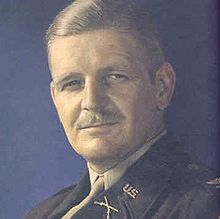Reuben H. Tucker
Reuben Henry Tucker III (born January 29, 1911 in Ansonia , Connecticut , † January 6, 1970 in Charleston , South Carolina ) was an American 2-star general.
He was from December 1, 1942 to May 10, 1946 commander of the 504th Parachute Infantry Regiment ( 504th Parachute Infantry Regiment ).
Life
Tucker attended the United States Military Academy at West Point , graduated there in 1935, and was appointed lieutenant. The next day he married. He and his wife had five sons together.
The first stop in his military career was the 9th Infantry Regiment in Fort Sam Houston , Texas . He then served with the 33rd Infantry Regiment in Panama and volunteered as a first lieutenant for paratrooper training at Fort Benning , Georgia . After completing his training, he was transferred to the 504th Paratrooper Battalion. After the establishment of the 504th Paratrooper Regiment belonging to the 82nd Airborne Division on May 1, 1942 , Major Tucker became its Executive Officer XO and on December 6, 1942 , the division commander, Major General Matthew B. Ridgway , elected Tucker as commander of the 504th regiment. At 31 years old, Lt. Col. Tucker was one of the youngest regimental commanders in the US Army during World War II .
With this regiment Tucker took part - first under Ridgway, then under James M. Gavin as part of the 82nd Airborne Division - in the Allied airborne operations on the Italian theater of war. On July 11, 1943 , Tucker led his regiment in the invasion of Sicily (→ Operation Husky ). Mistakenly mistaken for enemy aircraft, Tucker's aircraft were fired at by its own ground and ship artillery and suffered considerable losses. 23 planes were lost, a large number of the men were killed or wounded and the regiment was scattered all over the island. Only 400 of the original 1600 soldiers reached their target area.
Colonel Tucker was awarded the Distinguished Service Cross twice during World War II , the US's second highest valor. One of the two medals, for "extraordinary heroism under enemy fire" , was presented to him personally by President Franklin D. Roosevelt during a trip to Sicily in December 1943.
After the war, Tucker served various staff and troop assignments, including commander of the 1st Cadet Regiment at West Point, teacher and student at Air War College , cadet commander in the Citadel , deputy commander of the 101st Airborne Division , commander of Fort Dix and chief of staff G -3 in the US Army in the Pacific until he retired as Major General in 1963 .
He settled in Charleston, South Carolina, to become a cadet commander for the second time (until 1968) at the Citadel , a military college. On January 6, 1970, he collapsed on the Citadel campus after suffering a heart attack. He was buried on January 9 in Beaufort National Cemetery in Beaufort , South Carolina, near his son, Major David B. Tucker, who died in Vietnam.
Awards
Selection of decorations, sorted based on the Order of Precedence of Military Awards :
-
 Distinguished Service Cross (2 ×)
Distinguished Service Cross (2 ×) -
 Army Distinguished Service Medal
Army Distinguished Service Medal
-
 Silver Star
Silver Star
-
 Legion of Merit (2 ×)
Legion of Merit (2 ×) -
 Bronze star
Bronze star
-
 Purple heart
Purple heart
-
 Army Commendation Medal
Army Commendation Medal
| personal data | |
|---|---|
| SURNAME | Tucker, Reuben H. |
| ALTERNATIVE NAMES | Tucker, Reuben Henry III (full name) |
| BRIEF DESCRIPTION | American 2-star general |
| DATE OF BIRTH | January 29, 1911 |
| PLACE OF BIRTH | Ansonia (Connecticut) , USA |
| DATE OF DEATH | January 6, 1970 |
| Place of death | Charleston (South Carolina) , USA |
